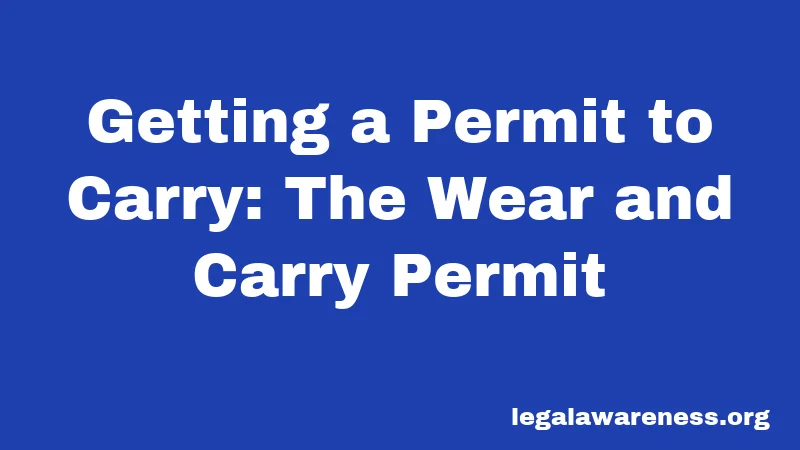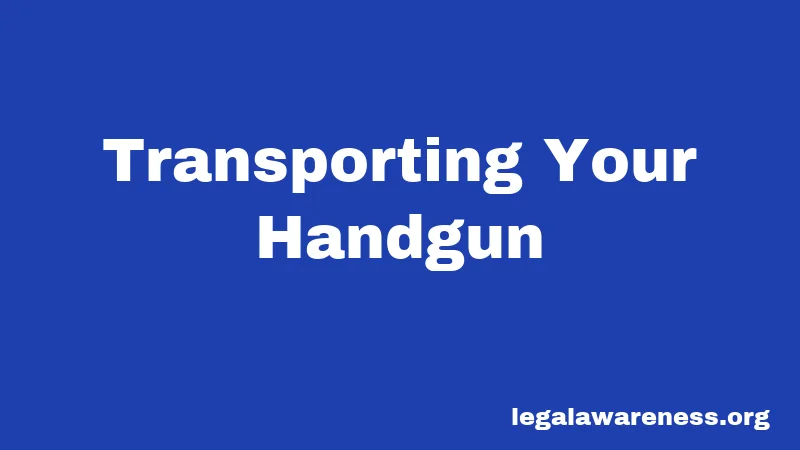Maryland Gun Laws in 2026: Everything You Actually Need to Know
Most people think they understand gun laws. Then they move to Maryland.
Honestly, Maryland has some of the strictest firearm regulations in the entire country. The rules are detailed. There are exceptions to the exceptions. And getting it wrong can cost you big time.
The good news? You’re not alone in finding this confusing. Thousands of Marylanders get caught off-guard every year. But here’s the thing—you don’t have to be one of them. This guide breaks down the real rules in plain English so you can stay on the right side of the law.
What You Can and Can’t Own in Maryland

First things first. Not every gun you see online is legal here.
Maryland allows you to own handguns, rifles, and shotguns. But there are restrictions. Assault weapons are banned. High-capacity magazines (anything over 10 rounds) can’t be sold or transferred. Machine guns are illegal unless they were registered before 1981.
Think of it like this. Just because a gun is legal in Virginia doesn’t mean it’s legal here. Each state plays by different rules.
So what counts as an assault weapon? Great question. Maryland’s definition focuses on features like detachable magazines, pistol grips, and things like flash hiders. An AR-15 style rifle? Generally illegal unless it’s modified to remove those features.
The banned list includes AK-series rifles, certain Ruger models, and semi-automatic shotguns with specific characteristics. It’s not always obvious. When in doubt, ask a dealer before you buy anything.
Getting a Handgun: The Long Road
Here’s where Maryland gets serious. You can’t just walk into a store and buy a handgun.
You need a Handgun Qualification License first. It’s called an HQL. Without it, you literally cannot purchase a handgun in Maryland. Period.
The HQL Process Step by Step
Getting your HQL involves several moving parts. Let me break this down because this part matters.
Step 1: Firearms Safety Training. You need to complete a 4-hour firearms safety course taught by a Maryland-approved instructor. This course costs money—typically a few hundred dollars depending on where you go. The training covers Maryland gun laws, safe handling, and storage. You need to complete this within 3 years before applying.
Step 2: Fingerprinting. You’ll get fingerprinted through an official process called LiveScan. This isn’t cheap either. You’re looking at additional fees. The fingerprints get sent to the FBI and Maryland for a background check. Good news: those fingerprints are valid for 12 months.
Step 3: Submit Your Application. Once you’ve got your training certificate and fingerprint receipt, you submit online through the Maryland State Police portal. There’s a $50 application fee. You can’t skip this.
Step 4: Wait and Hope. Maryland has up to 30 days to approve or deny your HQL. In reality, it often takes a couple of weeks.
Even after you get your HQL, you still can’t immediately buy a gun. Hold on, I know that sounds ridiculous. You then need an additional background check when you actually purchase the handgun, plus a 7-day waiting period.
So start to finish? You’re looking at several hundred dollars and probably 4-8 weeks.
Who can’t get an HQL? Maryland will deny you if you’ve been convicted of certain crimes. Specifically, any felony or misdemeanor with a maximum penalty of more than 2 years counts as a disqualifier. You also can’t qualify if you’ve been convicted of a crime of violence.
Getting a Permit to Carry: The Wear and Carry Permit

Okay, so you own a handgun legally. Now you want to carry it outside your home.
Good news: Maryland is a “shall issue” state. This means if you meet the requirements, the state must issue you a permit. You don’t need to prove why you want to carry. That’s a big deal.
The permit is called a Wear and Carry Permit (WCP).
What You Need for a Wear and Carry Permit
To get approved, you must meet specific requirements. Here’s what Maryland needs from you.
Age requirement: You must be at least 21 years old. There are rare exceptions for 18-20 year-olds doing security work, but that’s the exception.
Training: This is more intense than HQL training. You need 16 hours of training for your first permit. That includes both classroom and live-fire instruction. If you renew, it’s 8 hours. This training covers Maryland law, situational awareness, and firearms proficiency.
Background check: The Maryland State Police will conduct a thorough investigation. They check state and federal databases. They verify you haven’t been convicted of disqualifying crimes.
Fingerprinting: Yes, more fingerprinting. And yes, more fees.
Additional hurdles: You can’t be subject to protective orders. You can’t be under a court order related to your mental health. You can’t have active warrants.
The permit is valid for 5 years. When it expires, you’ll renew with 8 hours of training instead of 16.
Big Change Coming: Constitutional Carry (October 1, 2025+)
Wait, here’s something important that just changed. Maryland passed legislation allowing what’s called “constitutional carry” starting October 1, 2025.
This means people 21 and older can carry handguns without a permit. But—and this is a big but—there are still restrictions. You still can’t carry in schools. Government buildings are still off-limits. It’s not a free-for-all.
Most of the sensitive places restrictions stay in effect. The permit still exists and is still useful. Many people will probably still get one. Think of it as optional rather than mandatory.
Where You Can and Cannot Carry
Here’s where mistakes happen. All the time.
Even with a valid permit, there are places you absolutely cannot carry a firearm.
Prohibited areas include:
School property is a complete no-go. Not just the building—the entire grounds. We’re talking parking lots too. Violating this carries up to 3 years in prison.
Government buildings are off-limits. That includes courthouses, police stations, and most state offices.
Establishments that primarily serve alcohol are restricted. Bars and liquor stores are included here.
Certain mental health facilities and hospitals prohibit firearms.
Areas within 1,000 feet of protests or demonstrations (if law enforcement tells you to leave).
Some private businesses have signs prohibiting weapons. You must respect those.
Lodging establishments can refuse service if they think you have dangerous items like firearms.
Sound complicated? It’s actually pretty straightforward once you know the main places. Schools and government buildings are the big ones. When in doubt, leave your gun at home.
Transporting Your Handgun

Moving your gun from point A to point B? There are specific rules.
Your handgun must be unloaded when transported. It needs to be in a locked container, secured case, or holster with a retention device. Ammunition goes separately. The best practice is keeping the gun in your trunk if you’re in a vehicle.
You can only transport a handgun between these locations: your residence, a shooting range, a repair shop, a business you substantially own, or back and forth from any of those places.
You can’t just drive around with a gun for fun. “Just passing through” doesn’t cut it.
Violating transport rules carries a misdemeanor charge. That’s up to 1 year in jail and a $1,000 fine.
Rifles and Shotguns: Different Rules
Long guns (rifles and shotguns) have fewer restrictions than handguns. Key word: fewer, not none.
You don’t need an HQL to buy a rifle or shotgun. That’s a relief, right? You still need to pass a background check. You still need to be 18 and have no disqualifying convictions.
But here’s the catch: Certain rifles are banned. Any rifle that looks like an assault weapon runs into trouble. If it’s semi-automatic with certain features (adjustable stock, pistol grip, flash hider), it’s probably illegal.
Shotguns are mostly fine. But shotguns with a folding stock or certain modifications might cross the line into “assault weapon” territory.
When buying a rifle, ask the dealer directly if it’s Maryland-legal. Don’t guess. Getting this wrong means felony charges.
Prohibited Persons: Who Cannot Own Guns
Maryland won’t let certain people own firearms. Ever.
You’re prohibited if you’ve been convicted of a felony. You’re prohibited if you’ve been convicted of any crime of violence (assault, robbery, rape, etc.). You’re prohibited if you’ve been convicted of drug-related crimes under state law.
You’re also prohibited if you’re under a restraining order. If you’re subject to an extreme risk protective order (Maryland’s “red flag” law), your guns get temporarily removed.
If you’re an undocumented immigrant, federal law prohibits firearm ownership. If you’re a convicted domestic abuser, you cannot own guns.
Medical cannabis users face a tricky situation. Maryland allows medical cannabis. But federal law says cannabis users cannot own firearms. Federal law wins here. Be aware.
What Happens If You Break These Laws
The penalties in Maryland are serious. Really serious.
Carrying a handgun without a permit: This is a misdemeanor. First offense? You’re looking at 30 days to 3 years in jail and $250 to $2,500 in fines. Repeat offense? Up to 10 years in prison.
Carrying a gun on school property: Up to 3 years in prison. Period. No exceptions for permits.
Possessing an illegal firearm: Up to 10 years in prison and a $5,000 fine.
Illegal possession by a prohibited person: Up to 15 years in prison, with a mandatory minimum of 5 years.
Using a gun in a crime: This adds additional time on top of whatever you’re convicted of. We’re talking extra years stacked onto your sentence.
These aren’t traffic tickets. These are life-altering criminal convictions. They go on your record forever.
Special Situations Maryland Residents Should Know
Traveling out of state: Maryland permits aren’t recognized in most states. You’re not just breaking Maryland law if you carry illegally in another state—you’re also breaking federal law. Research before you travel.
Private sellers: If you buy from a private person, you still need to follow all the rules. The HQL requirement applies. The background check requirement applies. A friend selling you their gun? Same rules as a dealer. The only slightly different rule applies to long guns (rifles and shotguns) between private sellers, but it’s complicated.
Storing firearms safely: When guns aren’t in use, they should be locked in a secure location. This is especially important if you have kids in the house. Failing to secure a firearm where a minor can access it carries criminal penalties.
Red flag laws: Maryland allows family members or law enforcement to petition the court to remove your firearms temporarily if you’re considered dangerous. The court can order you to surrender your guns. This is enforceable and serious.
How to Stay Compliant: Your Action Plan
Let’s make this practical. Here’s what you should do if you want to own and carry firearms legally in Maryland.
Step 1: Determine if you’re legally eligible. Check if you have any disqualifying convictions. If you’re unsure, contact a lawyer before investing time and money.
Step 2: Take your 4-hour HQL safety course from a Maryland-certified instructor. Choose a reputable facility. Save your certificate.
Step 3: Get your LiveScan fingerprints done through an approved vendor.
Step 4: Apply for your HQL through the Maryland State Police online portal.
Step 5: Once approved, shop for a handgun at a licensed dealer. The dealer will handle the background check and 7-day waiting period.
Step 6: If you want to carry (and you do if you’re reading this), take your 16-hour Wear and Carry course.
Step 7: Apply for your Wear and Carry Permit through the same state police portal.
Step 8: Once approved, follow all the rules about where you can carry and how to transport your weapon.
Step 9: Renew your permits before they expire. Mark your calendar.
Step 10: Stay informed. Maryland law changes. Check the state police website and trusted legal sources regularly.
Yes, it’s a process. Yes, it costs money. But it keeps you on the right side of the law.
Frequently Asked Questions
Can I buy a gun from someone in another state and bring it to Maryland?
Not really. Handguns must be purchased through a Maryland licensed dealer. You still need an HQL. For long guns, you can buy from out-of-state dealers, but the gun itself must comply with Maryland law (no assault weapons). Federal law still applies—the gun must be transferred through a licensed dealer.
What if I’m licensed to carry in another state?
Maryland doesn’t recognize other states’ permits. Doesn’t matter if you have a Virginia or Pennsylvania carry permit. In Maryland, you follow Maryland rules. Carry without a valid Maryland permit and you’re breaking the law.
Can I keep a loaded gun in my car?
Only if you have a valid Wear and Carry Permit and the gun is concealed. Even then, there are places you can’t have it. Without a permit? No, absolutely not.
What’s a “regulated firearm”?
Maryland’s term for handguns and certain rifles that look like assault weapons. These require an HQL to purchase. Regular rifles and shotguns aren’t typically “regulated firearms” (unless they’re banned outright).
Do I need a permit to own a gun in my home?
No. You can own firearms in your home without a permit. But you still need to meet eligibility requirements (no felonies, no crimes of violence, etc.). You can’t be a prohibited person.
What counts as improper storage?
Basically, keeping a gun where kids can access it. Leaving a loaded gun on a nightstand. Storing ammunition in an unlocked cabinet. Proper storage means locked safe, locked case, or other secure method that prevents unauthorized access.
Can I hunt with an assault weapon in Maryland?
No. Assault weapons are banned regardless of whether you’re hunting. Your hunting rifle cannot have the banned features. Talk to the Department of Natural Resources about specific hunting regulations.
Final Thoughts
Maryland’s gun laws are strict. There’s no way around that. But you can follow them. Thousands of Marylanders own and carry firearms legally every single day.
The key is understanding the rules before you break them. Do your training. Get your fingerprints. Apply for your licenses. Know where you can and cannot carry. Respect the prohibited places.
It takes time. It costs money. But the alternative is criminal charges that derail your life.
Now you know the basics. Stay informed, follow the law, and when in doubt, ask a lawyer or contact the Maryland State Police directly. They have resources online too.
You’ve got this.
References
Maryland State Police – Handgun Qualification License
Maryland State Police – Wear and Carry Permit
Maryland Criminal Law Article – Gun Statutes
ATF – Maryland Firearms Statutes and Codes
